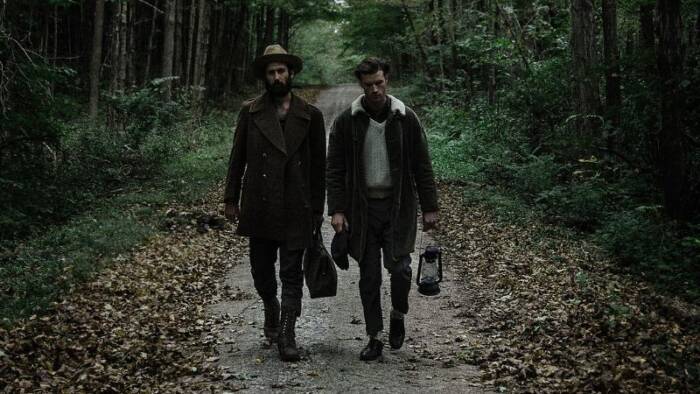
By Roger Costa
EYIMOFE- THIS IS MY DESIRE
As he notifies his aging father on the tragic death of his entire family, wife and kids, Mofe hangs up the phone and collapses in tears. But it’s a sudden, expected and very quick demonstration of weakness, as he breathes in, bringing back his courage and strength, as he knows he needs to keep himself firm and strong to endure such a situation. This sort of anguished reaction, made of a deep silence and a profound, painful irreversible sadness, will permeate some important moments in the narrative, revealing the turmoil the poor, working class people must face in order to survive in modern Lagos.
Though their visible sadness and hopelessness is there, both Mofe, an electrician, and Rosa, a hairdresser, who share the same neighborhood, visit the same places, but never cross path with each other, are strong people who won’t deny a good fight for their rights and wellbeing. As Mofe deals with a series of bureaucracy, negligence and absurdly expensive costs for medical assistance and burial procedures, Rosa goes through similar economic obstacles, overwhelmed on the care of her younger pregnant sister and pressured by her landlord, who insists on marrying her in exchange for a better life. They are also connected by the idea of leaving Lagos and attempting better opportunities in Europe, doing the impossible to gather money and relevant status to gain access and a Visa.
An assured, confidant, unique and magnificent directorial debut, Chuko Esiri and Arie Esiri’s film breathes lyricism and sociopolitical activism at equal measures, creating an affecting, deeply moving and triumphantly organic portrait of survival and dignity, exploitation and integrity, ambition and humanitarian values.
The actors are impressively charismatic and convincing, the atmosphere feels very natural and tender, as well as the textures of the camera work, capturing raw light and the vibrant colors of the dystopian, unbelievably chaotic city landscape.
Addressing relevant issues related to the exploitation of people’s rights and opportunities that should’ve been given to the minority, the directors craft an alarming, urgent tale of resistance, while claiming for righteousness.
A film that had me clapping throughout it, a mesmerizing, humble and powerful first work, one that deserves Award attention and is undoubtedly among this year’s most potent surprises.
(Janus Films. 8/13. BAM Cinema, Brooklyn.)

WHITE AS SNOW
A constant observer of young female love explorations, director Anne Fontaine (“Coco Before Chanel”, “The Innocents”) latest is a soft and energizing erotic comedy about the adventures and initiations of a young lady in process of grieving her father.
Claire is a very timid young woman who works for her stepmother at her late father’s restaurant. One day she is abducted and when regains consciousness she is at a remote mountainous area, where she will learn how to take care of herself in other ways: she will become a woman, seducing and being seduced by several men. When her stepmother finally decides to search for her, a net of jealousy, resentment and broken alliances surfaces, as well as a dark twist involving their ambiguous and artificial relationship.
Reimagining and giving a modern, sexy and utterly erotic wardrobe to the classical story of Snow White and the seven dwarfs, Fontaine chooses a delicate and humorous, stylish and easily universal language, conceiving her most audacious and compelling coming of age story to date. Isabelle Huppert is enigmatic as always, embodying a mysteriously evil woman capable of freezing everyone’s joy with her icy looks, determined to accomplish her interests under any circumstance.
Award-winning actress Lou de Laage enriches the screen with her exquisite beauty, generously highlighted by her lips, big eyes and pale skin, conceiving an irresistibly clueless and recklessly instinctive, impossible not-to-fall-for Claire. Examining the relevance and standards of beauty, youth and sexuality, Fontaine irreverently and efficiently comments on the fear of aging and its inevitable process in this feminist saga about the uneasiness of promiscuous love.
(Cohen Media Group. 8/13. Quad Cinemas.)

CURIOSA
A photographer intensely flirts with a young aristocrat woman, as she melts herself completely, through the long walls of a hallway. The emotional and physical attraction is mutual, since the first time they laid eyes on each other. The intensity of the scene, right in the beginning of the first act, and perhaps the only one carrying a sense of innocence in this provocative and torrid sexually-charged melodrama, feels like a hunting exercise, a flirtatious chase between two cats intoxicated by lust and desire, as they clearly demonstrate they can’t focus on anything else, but on each other. The sequence gets even more exciting with the director’s choice of music: instead of a classical tune, which is usual in period-set dramas, the screen if fueled with a modern, techno-style, eclectic soundtrack reflecting the ahead-of-time timeline and narrative. The result elevates the eroticism in the film, which will provide elegantly crafted and performed scenes of explosive sensuality and unafraid nudity.
After working on TV movies, director Lou Jeunet makes her directorial debut with clear demonstrations she still composes images with the shadows of her former activity but impressively executes the material with precise emotion and freshness. Spanning years in the lives of the lovers, examining individual dilemmas (her passionless marriage, his obsessive artistic inspirations and compulsive sexual appetite) as well as the consummation of their prohibited, not so secretive affair, Jeunet scores a frenetic, steamily gripping tale about bohemia and uncontrollable desire.
The main attribute though, is earned by the charisma and deeply provocative and convincing performances from its central pair of actors, Noémie Merlant (“Portrait of a Lady on Fire”) and Niels Schneider (“Sibyl”), in personifications loosely based on the true stories involving the 19th Century affair between Parisian poet and photographer Pierre Louys and author Marie de Regnier.
The film is also populated by other amusingly eccentric and sexually-curious folks, including the poet’s friends who engage in orgies and other discoveries, and an “exported” exotic dancer who can easily seduce men and women alike. This character is played with grand bravura and courage by Camelia Jordana, the Cesar Award winner actress, who also co-starred in the lovely rom-com “Lover(s)” alongside Schneider (it is also known as “The things we say, The Things we Do”, a 2020 Cannes Selection).
Filled with seductive, sharp dialogue escalating the heat and leading to bed throughout the entire film, and gorgeously shot, it is an accomplished bi-character study about desire and lust, deeply involving in its depiction of male and female’s carnal interests, one of the most incendiary and efficient sexual dramas in recent memory.
(Film Movement. 8/13. Mayfair Theatre, Ottawa. Also on Virtual Cinemas and On Demand.)

WHELM
Two estranged brothers set foot on the wilderness to avenge a family matter and become involved in the bloody rivalry game between two robbers, a psychotic newcomer and the notorious Dillinger in writer-director Skyler Lawson’s astonishingly shot and executed feature debut.
Using the brilliance of cameras in 16mm this Neo-western is set in the American Midwest during 1930’s Great Depression capturing essential light, angles and style with masterful craft. The work done here is a revelation in the indie field, as sumptuous and deeply engaged in its material and techniques as any big budget Hollywood production.
Named Best Feature Drama at Burbank International Film Festival, Lawson is certainly one filmmaker to watch. Immersive and suspenseful, he manages to keep the brothers’ twisted journey satisfyingly entertaining (as well as a spectacle for the eyes) while addressing male greed, ambition and pride through 13 chapters, beautifully and meticulously composed with a sense of lyricism and triumph.
(Gravitas Ventures. 8/13. The Fine Arts Theatre, Beverly Hills and On Digital Platforms.)



















Comments